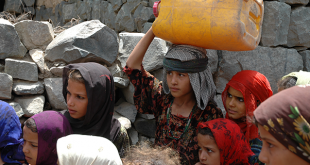The New York Times published a feature this week titled “Is Yemen the Next Afghanistan?” This article and others should spur much-needed debate and action for a peace strategy in Yemen.
This is a country with an Al Qaeda presence, as well as a conflict in the North between the government and rebels. It’s also a country with high levels of hunger, malnutrition and poverty.
The UN World Food Programme (WFP) is working on the food security angle to the crisis facing Yemen. Maria Santamarina is one of the WFP officers trying to build support for helping one of the most food-insecure countries in the world. In Yemen, one in three people suffer from hunger.
Some of Maria’s recent work has focused on a Food for Education program designed to help children escape Yemen’s poverty trap. She shares her writing with us:
“For some 800,000 vulnerable Yemenis like Abdo and his family, there is some hope thanks to the Food for Education programme. ‘This programme has changed our community. Not only has it provided families with vital food support, but it has made a huge difference in the number of girls enrolled. Before, we only had 18 girls at the school – now there are 61,’ said Mohammed, the Principal of Anwar school.
“Arwa, second grade, sits on a bag of WFP wheat in the courtyard. Like many in Yemen, where births are often not recorded, she does not know her exact age. For Arwa and her family of 7, money and food are very limited, and they rely on bread and milk for all meals. ‘The most important part of my going to school is to receive the support provided by WFP; we need this food for our home.’ “
There is no doubt that Food and Education for all children in Yemen could bring about amazing change. This is one area where WFP, the government of Yemen and international partners could really work together.
Child in Yemen receiving take-home rations are part of WFP’s school feeding. Low funding for WFP has allowed for only one school feeding distribution since June, 2009. (Maria Santamarina/WFP)
However, low funding from the international community has devastated the initiative. Maria writes:
“Despite the success and criticality of Food for Education, the operation is plagued by inconsistent and low funding, with a shortfall of 80% of its requirements for 2010. As a result, the programme has had to significantly reduce beneficiaries and rations. The repercussions have already been felt.
“In May 2010, Arwa did not receive the much needed food for her family.
“Of perhaps more serious concern is the impact on girls’ enrollment. Already there has been an increase in drop out rates between May 2009 and April 2010.
“When the Food for Education programme could no longer be implemented as planned due to lack of resources, Abdo withdrew his ten daughters from school. ‘When WFP was regularly providing food to schools, I could afford to spend some of our limited income to buy books or some clothes for my daughters. I can no longer afford to do so. Now, I work only to feed my family.’
“Abdo’s daughters now spend their days collecting water and sitting around. ‘We want to go to school. I was in second grade when we had to leave. It makes me angry and sad – but we know there is not enough money,’ said Abdo’s 15 year old daughter Miriam. ‘My wish is to be a teacher, but it will be difficult to do since I was unable to complete school. For now I can only dream.’
“Following the May 2010 distribution, the Food for Education programme is now entirely suspended pending further donor support.”
Maria and other WFP staff will keep working and advocating to restore the program. They know that feeding and educating children in Yemen is the road to peace and development in that country. Will anyone listen?
A relief fund for Yemen has been set up at the World Food Program USA site
Video of a WFP Food For Education Distribution in Yemen. The only one this year because of low funding.
 Blogcritics The critical lens on today's culture & entertainment
Blogcritics The critical lens on today's culture & entertainment



